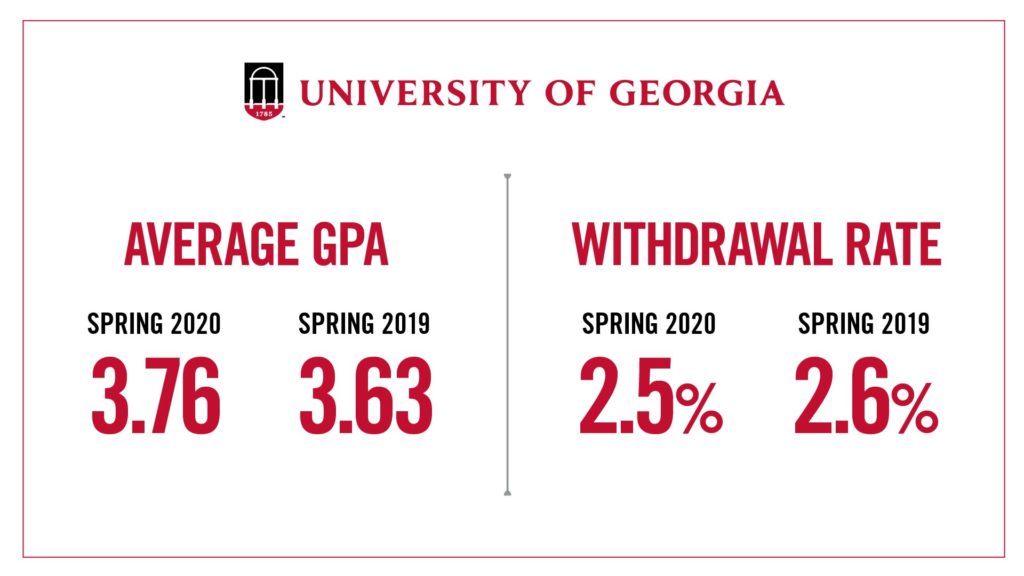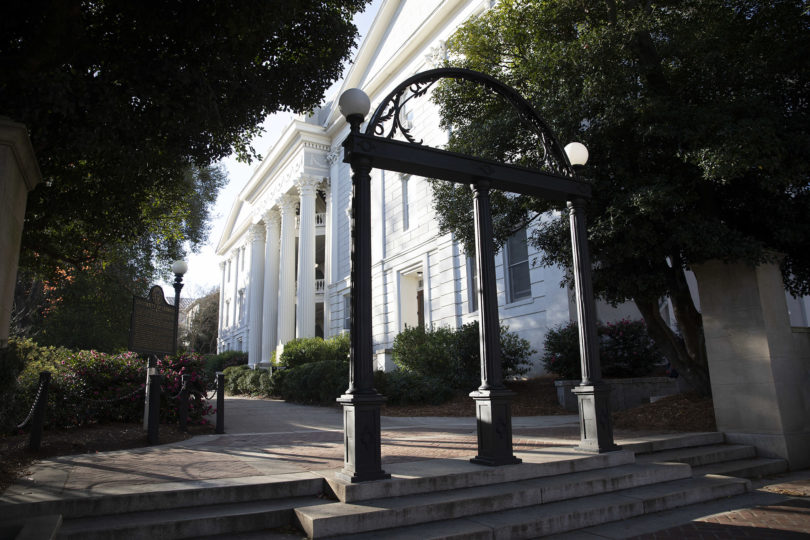The sudden shift to online instruction at the University of Georgia hasn’t slowed students’ progress toward graduation. Data from spring 2020 show that grade point averages and withdrawal rates were comparable with previous years. Preliminary data show record summer enrollment, as well.
The average GPA for UGA students was 3.76 in spring 2020, compared with 3.63 in spring 2019. The average withdrawal rate was 2.5% in 2020, compared to 2.6% in 2019.
“Our faculty and staff pivoted quickly to deliver outstanding online learning experiences, and our students have shown extraordinary resilience in a difficult time,” said S. Jack Hu, the university’s senior vice president for academic affairs and provost. “I know it wasn’t easy, but I’m proud of what everyone has accomplished.”
A rapid pivot
In response to the COVID-19 pandemic, the University System of Georgia announced on March 16 that all 26 of its institutions would move to online instruction for the remainder of the semester. Faculty quickly moved their courses online, with several campus units supporting their efforts behind the scenes.
The Center for Teaching and Learning and Office of Online Learning (OOL), for example, provided one-on-one consultations and larger sessions for groups of faculty via Zoom. Enterprise Information Technology Services and the University Libraries adjusted their hours of operation to expand technical support.
While UGA faculty were learning new ways to teach their classes, they were also discovering new ways to interact with students.
Margaret Christ, an associate professor of accounting in the Terry College of Business, turned her original class meeting time into office hours when students could drop in for live vidchats. She said the sessions were part teaching and part counseling.
Maryann Gallagher, a lecturer in the School of Public and International Affairs, shared her cell number and told students they could call anytime with concerns related to class, jobs, family, or anything else going on in their lives. She also surveyed students, asking them about their biggest concerns with regard to online learning.
 “With some students, this is the first time they’re taking an online course, and they’re taking four or five at the same time,” she said. “And everybody has different preferences for what system they want to use and how they’re going to do it.”
“With some students, this is the first time they’re taking an online course, and they’re taking four or five at the same time,” she said. “And everybody has different preferences for what system they want to use and how they’re going to do it.”
Because of that wide range of needs, Gallagher recorded her lectures and posted class materials online so that students could access them on their own time.
Nick Fuhrman, Josiah Meigs Distinguished Teaching Professor in the College of Agricultural and Environmental Sciences, chose to hold his classes in real time.
“One thing the students enjoy about this is that it is fluid,” he said. “Students ask great questions on chat, and we can capitalize on that. I like to kind of relax a little and have some fun with it. I use the GoPro or spin the computer’s camera around to show them I’m doing a demo on my kitchen table. It’s not NBC-quality video, but I think it builds a sense of rapport when students and instructors see into each other’s lives a little bit.”
President Jere W. Morehead reflected on the flexibility and perseverance of the UGA community. “I remain very proud of our dedicated faculty and our resilient students during the COVID-19 pandemic,” he said. “This very high level of academic success should make all graduates and supporters of UGA very proud as well.”
Student support and success
To be sure, students and faculty missed in-person interactions with each other and the palpable energy of a campus that brings nearly 39,000 students from across Georgia and around the world together. The pandemic also led to a number of other challenges – from health and economic concerns, to access to technology, space or other resources widely available on campus. Yet students managed to succeed despite obstacles.
Logan Hutcheson, who is double majoring in biology and computer science, said that although it took a little while for him to get motivated to do coursework from home, he ultimately benefited from the transition. “One of my professors was awesome and was constantly available on Zoom to help out,” he said. “I probably would have received a C in the class but ended up with a B because of the extra support.”
Logan was originally planning to be in California this summer completing his Experiential Learning requirement by interning with the technology conglomerate Cisco. Luckily, Cisco moved all internships remotely, and Logan began his internship last month. “They’ve given me a project that is truly impactful,” he said.
Lack of dependable internet access was a problem for many students, particularly those from rural areas, and the university’s Division of Academic Enhancement responded by delivering wireless hot spots to the homes of more than 70 students.
Jaquarius K. Raglin, a student from Upson County, completed his spring semester coursework while also helping his sixth-grade sister with math homework and training to become a New Student Orientation Leader. “I especially enjoyed seeing professors at their homes during video conferences, during courses or office hours,” he said. “It made them seem more real and approachable.”
Increased access to asynchronous courses has enabled Raglin to enroll in three classes over the summer while also engaging with incoming students virtually as an Orientation Leader.
Vice President for Instruction Rahul Shrivastav noted that although final summer enrollment figures won’t be available until July, preliminary data show that this year’s enrollment has increased more than 3% over last year and has already topped 18,500 students—a new record. He added that online instruction has been particularly important in keeping students with disrupted study abroad or internship plans on track to graduation.
“Student satisfaction with online instruction in the spring has translated to record online enrollment in the summer,” Shrivastav said. “It hasn’t been easy for anyone, but it has been appreciated.”








